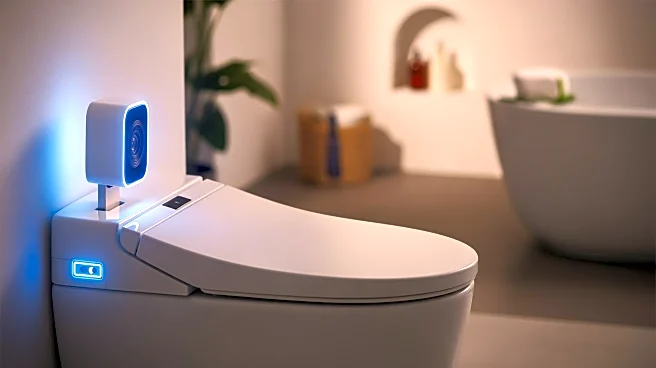What's Happening?
Kohler has launched a new health tracker called the Dekoda, designed to be attached to toilets to provide health insights based on bathroom usage. The Dekoda uses optical sensors and algorithms to analyze
waste, offering insights into hydration and gut health. It can also detect blood, potentially indicating serious medical issues. The data collected is accessible through the Kohler Health mobile app, available for iOS and soon for Android, with a membership fee. The Dekoda system includes a sensor, charging pad, and wall-mounted remote, and is available for preorder at $599.
Why It's Important?
The introduction of Kohler's Dekoda represents a significant advancement in personal health monitoring, integrating technology into everyday bathroom routines. This innovation could lead to improved health awareness and proactive management of hydration and gut health, potentially reducing healthcare costs and improving quality of life. The ability to detect blood in waste may prompt earlier medical intervention, addressing serious health issues sooner. Kohler's initiative reflects a growing trend towards connected health devices, emphasizing the importance of data-informed wellness solutions in modern lifestyles.
What's Next?
As Kohler's Dekoda becomes available, it may prompt further innovations in bathroom-based health monitoring technologies. The integration of such devices into daily routines could lead to broader acceptance and demand for connected health solutions. Kohler's approach may inspire other companies to develop similar products, expanding the market for health-focused smart home devices. Additionally, the data collected by Dekoda could contribute to larger health studies, offering insights into population health trends and influencing public health strategies.
Beyond the Headlines
The deployment of Kohler's Dekoda raises questions about privacy and data security, as sensitive health information is collected and shared through digital platforms. Ensuring end-to-end encryption and user differentiation through fingerprint sensors is crucial to maintaining user trust. The ethical implications of monitoring personal health data in private spaces may also be debated, as society navigates the balance between technological advancement and privacy rights.










